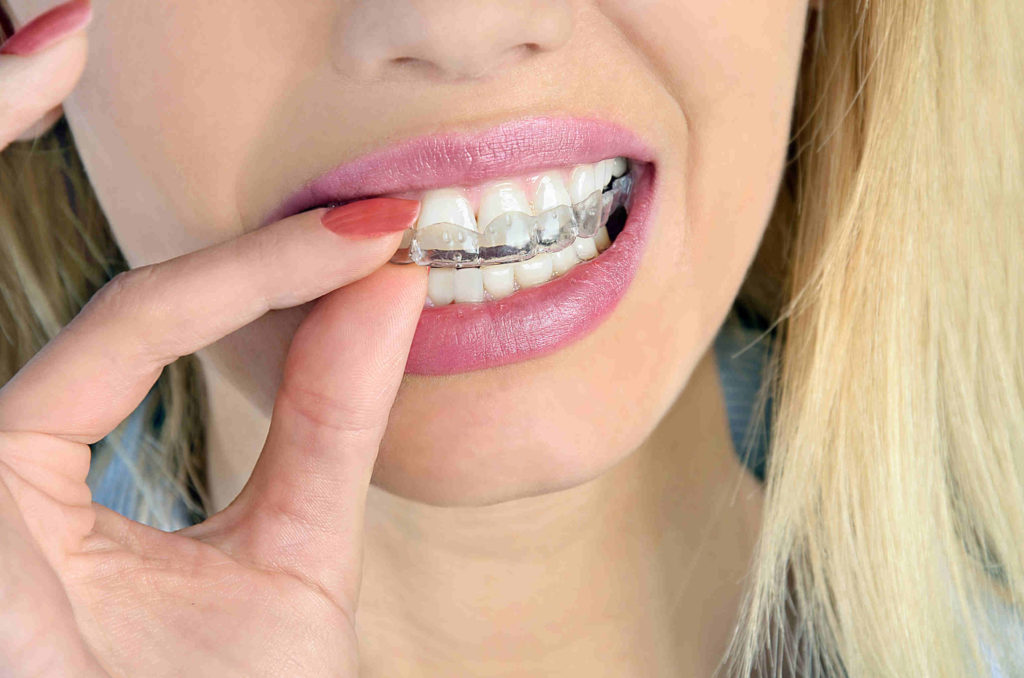The term "bruxism" refers to tooth clenching and friction without any functional purpose. Dentists in Lausanne and Fribourg also refer to persistent mandibular parafunction. Everyone clenches their teeth when they're irritated, but after a few moments they relax. That said, some people suffer from an uncontrolled functional disorder that causes teeth grinding and/or clenching. While the causes are often psychological, the consequences are detrimental to the quality of life. oral health. What is bruxism? How can I stop grinding my teeth? Discover the answers in the HELVIDENT article.
Understanding bruxism
There are two forms of bruxism:
- Daytime bruxism, which occurs during the day, is quite rare.
- Nocturnal bruxism, which occurs during sleep, is more frequent.
In concrete terms, bruxism translates into :
- uncontrolled grinding of lower teeth against upper teeth
- and/or continuous, forceful clenching of the jaws
The teeth, muscles, tissues and structures surrounding the jaw are therefore subjected to excessive pressure.
Symptoms of bruxism
- Accelerated wear of teeth, which become short, crumbling or sharp
- Loss of dental tissue (enamel, dentin and pulp)
- Dental fracture
- A broken dental crown or filling.
- Pain in the jaws, temples, cheeks, ears or cervical vertebrae
- Headaches or morning migraines
However, it can be difficult to diagnose, as many people are unaware that they are suffering. Some don't notice any symptoms at all, and so delay seeking help. In other cases, it's someone close to you who points out that you grind your teeth in your sleep.
The risk of complications
Bruxism left untreated can lead to long-term health complications.
- A chronic headache or earache
- Hypertrophy of the facial muscles, giving the face a wide, very square appearance
- Permanent dental damage
- Temporomandibular joint disorder
If in doubt, make an appointment at a dental clinic in Fribourg, Lausanne or Aigle. The dentist will carry out a clinical interview, an inspection of the oral cavity and, if necessary, an X-ray study.
Is it possible to treat bruxism?
In reality, tooth grinding itself cannot be treated. It is only possible to act on the consequences and, in some cases, prevent the damage. Here are the solutions available today.
Dental protectors
This accessory, also known as an occlusal plate or splint, is particularly useful in cases of nocturnal bruxism. The patient wears it while sleeping to prevent dental damage and temporomandibular joint problems. You can buy a standard mouthpiece from a chemist. The most effective solution is to wear an occlusal plate custom-made by your dentist. More comfortable, it adapts perfectly to the shape of your teeth and the size of your jaw.
Relaxation methods
Studies have shown the link between bruxism and stress, anxiety and depression. If you grind your teeth, it may be worth trying a relaxation technique that will benefit your overall health. You can choose from meditation, breathing exercises, sophrology or yoga, for example. Sport releases endorphins and reduces stress. You can also talk to someone close to you, or ask a psychologist to accompany you.
Orthodontics
In some cases, bruxism is caused by misaligned teeth, occlusal imbalance, malpositioned jaws or crooked teeth. Your orthodontist in Lausanne or Fribourg will suggest an appropriate treatment to align your teeth. Surgery is a last resort.
Botulinum toxin
In bruxism, the jaws are under stress. Therapeutic injection of botulinum toxin (Botox) is a possible solution. This product blocks neuromuscular junctions and reduces both the power and volume of facial muscles. This treatment is recommended in cases where bruxism has led to masseterine and temporal hypertrophy.
Factors that contribute to tooth grinding
Certain habits or health problems seem to encourage bruxism. These include
- alcohol and tobacco consumption
- neurological disorders
- visceral or endocrine problems
Bruxism can be temporary or episodic. A person prone to bruxism does not always remain so for the rest of his or her life. Bruxism also affects children, damaging their milk teeth.
In short, bruxism is a common pathology that can have several causes. It's essential to diagnose and treat it early to avoid long-term complications. We recommend that you consult a dentist for an oral health check-up. HELVIDENT dental clinics in Aigle, Fribourg and Lausanne are at your disposal. Contact us to make an appointment.

